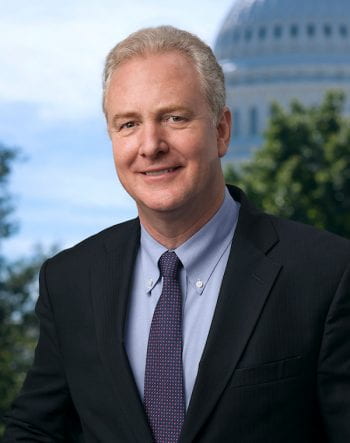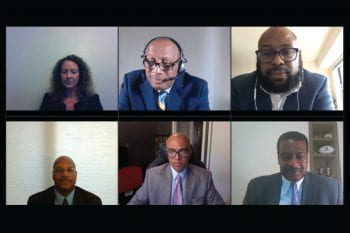Four experts on policing told a congressional briefing on June 30 that the values and training of social workers can be useful tools in re-imagining the nation’s approach to public order and reducing racist violence of police.
The online briefing, Black Lives Matter: Social Work and the Future of Policing, was sponsored by the Congressional Research Institute of Social Work and Policy (CRISP), the Center for Social Development at the Brown School, Washington University in St. Louis, and the National Association of Social Workers, in conjunction with the offices of Rep. Barbara Lee, MSW (D-CA), chair of the Congressional Social Work Caucus, Rep. Karen Bass, MSW (D-CA), and Sen. Chris Van Hollen (D-MD). It was moderated by Charles E. Lewis Jr., a political social worker and the founding director of CRISP, a nonprofit organization that works to engage social workers with the U.S. Congress. Over 3,000 people registered to attend the event, which was co-sponsored by over 20 prominent social work organizations and schools of social work.

The program opened with Sen. Van Hollen, who announced that he and Rep. Bass will co-sponsor legislation for a federal grant program for local police jurisdictions to train 911 operators to recognize emergency calls that don’t need police and to deploy social workers instead. Like the panelists, Van Hollen said incidents that involve issues such as mental health, substance abuse or homelessness could be better handled by social workers.
“Too often we witness an unnecessary escalation when police respond,” he said. “We need to make structural changes in how to respond to emergency calls.”
The panelists and other speakers largely agreed. Lewis said that while police are often the first contact that many people with severe mental illness have with government, it is social workers who are the largest providers of social services in the U.S.
Michael Sherraden, who initiated plans for the briefing, said, “This recognition of the need for structural change – not just behavioral change – will be essential to reducing excessive police violence against black Americans and other vulnerable populations.” A social worker, Sherraden is George Warren Brown Distinguished University Professor at Washington University in St. Louis.
In a policy brief released in conjunction with the event, Sherraden offered recommendations for new professional partnerships between police and social workers. “For the first time,” Sherraden wrote, there is national recognition that “policing is a core institution of White supremacy.” “After 400 years of racial violence, this is a remarkable recognition.”
George Patterson, a police social worker and associate professor in the Silberman School of Social Work at Hunter College, said the idea to include social-work principles and social workers in policing has been discussed since the early part of the 20th century.

One of the greatest needs, he noted, is more funding for police social workers. “We need to develop models for interventions to address a wide range of social problems,” he said, and then conduct research to determine whether those models are effective.
He also noted the importance of police social-worker training as partners with police. “Models of training are needed,” he said.
Panelist Carrie Pettus-Davis offered recommendations in addition to the first-responder issue. She said social workers can help treat trauma among law enforcement officers. “Untreated trauma can lead to impulsivity, aggression and misappraisals of threats of violence,” said Pettus-Davis, an associate professor at Florida State University and the founder of the Institute for Justice Research and Development.
She said federal funding for local police should require uniform training, accreditation and licensing standards. Social workers can help train police in human behavior, mental health, and institutional racism and its negative effects.
Like Patterson, Pettus-Davis said the nation should invest in research to assess the effectiveness of police interventions, the impact of training, and ways police collaborations with social workers can improve outcomes. “We cannot continue to make policy decisions based on anecdotal information or best guesses,” she said.
Panelist Derrick Jackson is a social worker who became a police officer and is now director, community engagement, in the Washtenaw County, MI, Sheriff’s Department. He said that while many think social workers and police are at opposite ends of the social spectrum, there is considerable overlap in what they do. Rather than work to raze law enforcement, he said, social workers should “engage with the criminal justice system.” This vision is also structural, bringing the professional values and skills of social workers into the criminal justice arena.
“If we just push from the outside, they’ll only build stronger walls,” he said, urging social workers to “work from the inside” in police departments. He acknowledged that many social workers disagreed with the concept. The key, he noted, is partnership, not social workers working for the police.
Jackson said this has worked in his department. “We are changing the basic assumptions that drive our officers and influence the behavior of officers on the street,” he said. “This is a fundamental shift of the meaning of law enforcement and connection to community.”
Monitoring of social media by police was the focus of panelist Desmond U. Patton, associate professor at Columbia University, who uses qualitative and computational data methods to examine youth, social media, and gang violence. He emphasized that the police now use social media for surveillance, which is contributing to disparate treatment of African Americans by law enforcement.
Postings by African Americans meant only to “project a tough image” can be wrongly used to “predict” criminal activity, he said. Yet, the hateful postings of Dylann Roof, who killed nine people at an African-American church in South Carolina, were largely ignored by police. He encouraged social workers to pay attention to this issue and “help use social media for social good.”
Near the conclusion of the program, Patton suggested that while many of the recommendations made at the briefing were worthwhile, the panel had not sufficiently addressed the racism at the core of much police misconduct.
“What we’re not talking about is the unlearning of white supremacy,” he said.
Credit: Photo by Matthew Henry on Unsplash.
